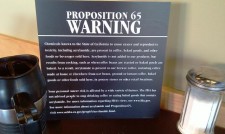 California s Proposition 65, which since 1986 has mandated this may cause cancer warnings on a multitude of everyday products, has provided nothing in the way of consumer protection but heaps in the way of consumer anxiety.
California s Proposition 65, which since 1986 has mandated this may cause cancer warnings on a multitude of everyday products, has provided nothing in the way of consumer protection but heaps in the way of consumer anxiety. California s Proposition 65, which since 1986 has mandated this may cause cancer warnings on a multitude of everyday products, has provided nothing in the way of consumer protection but heaps in the way of consumer anxiety. It has also managed to line the pockets of trial lawyers, Anastasia Killian with the Washington Legal Foundation writes in Forbes.com.
California s Proposition 65, which since 1986 has mandated this may cause cancer warnings on a multitude of everyday products, has provided nothing in the way of consumer protection but heaps in the way of consumer anxiety. It has also managed to line the pockets of trial lawyers, Anastasia Killian with the Washington Legal Foundation writes in Forbes.com.
One prime example is the latest suit filed by the Council for Education and Research on Toxics against coffee roasting companies for failing to warn consumers that their java contains acrylamide, a supposed carcinogen. But as Killan notes in her op-ed, Acrylamide is created during the process of roasting coffee beans; it s not an additive, and it s not new. So it s not as if the coffee that so many of us cling to as a morning ritual has suddenly become dangerous. The same coffee we ve been drinking for years, whether made by our neighborhood barista, or in our own homes, has always had acrylamide, and so do many other products heated during production.
Obviously California s legislators are not familiar with ACSH s classic Holiday Dinner Menu or they would be labeling a host of other naturally occurring carcinogens found in low doses in food such as the acrylamides found in bread, or the arsenic in potatoes, notes ACSH s Cheryl Martin.
Killan says California s Proposition 37, which would mandate labels for genetically engineered food if it passes in November, has similar problems: There comes a time when providing information is too costly, too misleading, and not valuable enough to justify providing it.
ACSH s Dr. Ruth Kava tackled California s Proposition 37 in a recent op-ed, which can be read in its entirety here. ACSH also published a lengthy critique of Proposition 65 in 2000.


